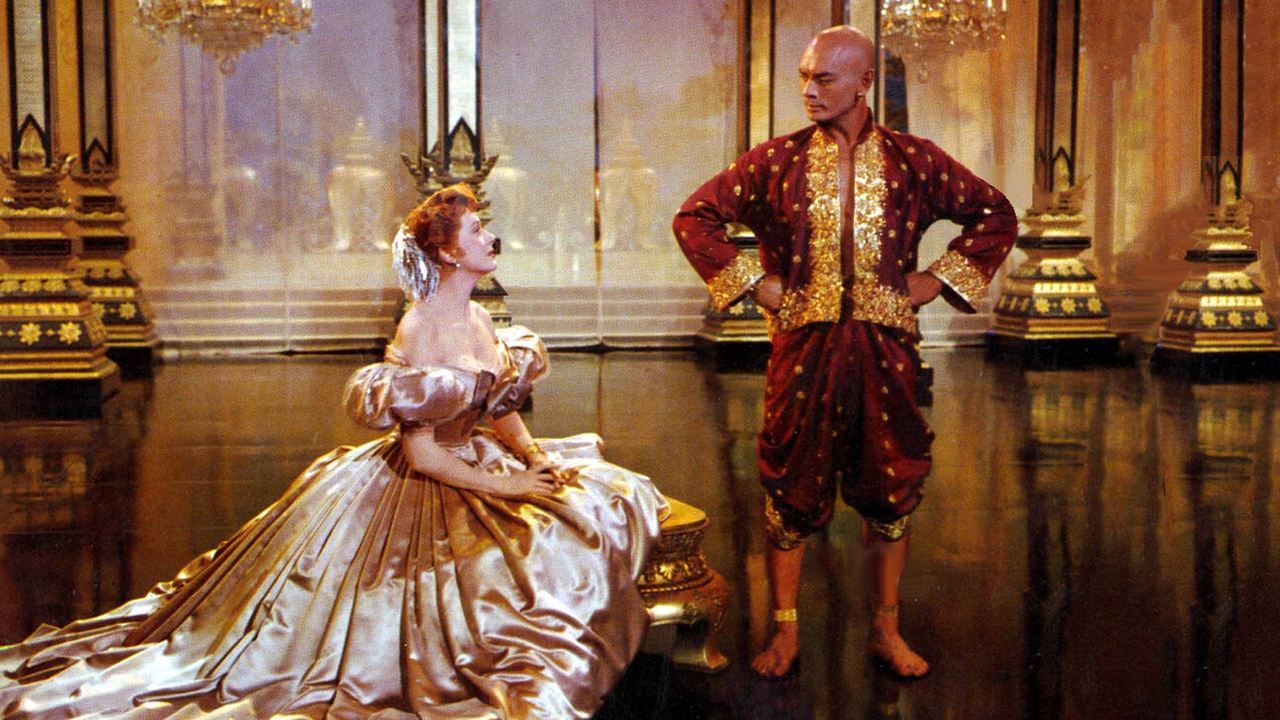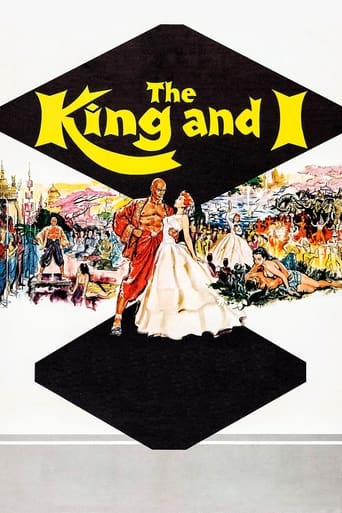

Waste of time
... View MoreThis is How Movies Should Be Made
... View MoreCharming and brutal
... View MoreThe story, direction, characters, and writing/dialogue is akin to taking a tranquilizer shot to the neck, but everything else was so well done.
... View MoreWritten originally as a stage musical for their friend Gertrude Lawrence, "The King & I" originally had it's emphasis on the "I," being adapted from Margaret Landon's documentary novel, "Anna & the King of Siam." When 20th Century-Fox released the film version in 1956, the emphasis had switched to "The King" in the title, as Yul Brynner was the only member of the Broadway cast to portray the same role in the film. Deborah Kerr was an excellent choice to play Anna, although hers, Rita Moreno's and Carlos Rivas' voices were all dubbed (Kerr's by Marni Nixon). The Fox CinemaScope 55 process (only used on this film and "Carousel," made the same year) provides a wonderful widescreen experience, however the use of DeLuxe color instead of a better color process seems to have cast a blue pallor over the screen images as the negative has aged. While this could possibly be corrected electronically using today's technology, recent home video releases have not made use of it. The acting in this classic musical is terrific, and the only gripe anyone would have with the film is that "Small House of Uncle Thomas" runs too long and should have been edited instead of sacrificing three musical selections from the stage version: "My Lord and Master" by Tuptim, "I Have Dreamed" by Tuptim and Lun Tha, and "Shall I Tell You What I Think of You" by Anna. All three appear on the soundtrack album, but not in the film itself, so the film is docked two stars for the omissions. Visually, Fox spared no expense with costume and set design and construction. Anna's hoop skirts were the fashion of the period in the U.K., and with Siam (now Thailand) being an equatorial territory, the Siamese royal characters were dressed appropriately. The palace set in Bangkok was opulent, making a viewer wonder if Siamese royalty was as affluent as 20th Century-Fox, and certainly no stage production on Broadway or anywhere else could have scenery such as that which Fox used in this production. The songs are great, the acting spot-on, and the only flaws in the film were mentioned above. Even if musicals aren't your thing, "The King & I" (correct title, with ampersand) is worth seeing. See this one BEFORE seeing "The Sound of Music," as from a cinematic perspective, this studio-bound film is the better one.
... View MoreAn arrogant, absolute monarch is brought down a peg or two by an English teacher in this Hollywood studio version of the story of the rule of King Mongkut over 19th century Siam. The art direction is lavish, staged colourfully, and with beautiful costume design. There are heartwarming scenes with the King's children even if the narrative is a little overtheatrical, and questionable for modern day audiences. As a musical it works because it is sequence driven and told in set pieces of meaningful to-the-point drama. It's overlong and over produced, and as popular as the songs are they are slightly less memorable as a Hollywood musical, though the musical score is uplifting. Yul Brynner is in majestic Oscar winning form having practised the role on stage for years and Deborah Kerr is perfectly cast to charmingly subvert him.
... View MoreI went through a period in my life when I didn't appreciate Yul Brynner as a performer, and obviously that would not have been a good time to sample "The King and I", but I'm over it now and I really enjoyed his performance in this film. His singing voice isn't that great, but he brought so much more to the part that it doesn't really matter. I particularly liked the scene where his numerous children are coming out to meet Anna; he has some nice interactions with the smaller kids who make protocol errors, and I love the proud way he holds up two fingers when a set of twins put in an appearance... obviously a great achievement in his life.At one point, though, I thought it almost felt like there were "too many songs"... the audience is bounced from one to another pretty quickly for a while there, and none of them are exceptional, although they all serve to advance the plot (and the problem I have with some musicals is that the songs don't do much for the story-line). The good songs, however, are VERY good. And the classic "Shall We Dance", with Anna and the King dancing round and round the ballroom... just wow. That must have been gorgeous on a big theater screen.Definitely worth a viewing for classic film and classic musical fans. Not really dated as some 50's movies are, because it's a period piece and it was already dated when it was filmed.
... View MoreYes, the King of Siam might seem like a Barbarian to us descendent's from Europeans, but even behind an apparent Barbarian is a human being with real emotions, desires and ambitions. It's the King's ambition to take on the best that European society can offer, so he's reviewing the situation with the help of an English nanny and teacher for his many children from his many wives. The towering presence of Yul Brynnur took the King from featured billing in the original Broadway production to above the title, and a featured actor Tony to leading actor Oscar, one of the few times in history that an actor won the award for the stage production then another one for the film production.The original musical Mrs. Anna was England's Gertrude Lawrence, and she got top billing over the title and Mr. Brynnur, but after she passed away, his success in the role moved him to the star spot with Mrs. Anna often second billed and often under the title when presented with him. Yul played the King on stage so many times that only Carol Channing's Dolly Levi rivals with him, and even when he was much older and dying from cancer, he was still performing the role on stage. There was even a T.V. series based upon the stories with him repeating his role. No actor since then has been able to become as identified with this part, and when you see this film, you will understand. "It's not a puzzlement!" in this case.Even though Rex Harrison ("My Fair Lady") had already played the role on screen (oppposite Irene Dunne in "Anna and the King of Siam"), it is Brynnur who dominates the memory of the philosophical king who can't quite escape his roots. Through his imperiousness, his tenderness and his love for his children, the King is quite a man, and it is understandable as to why Anna would constantly forgive him. As Lady Chiang (Terry Saunders) explains, "He'll always need your love, so he will get your love." And that is what makes him wonderful to each and every one of his wives, his mistresses and his children. Just not to Tuptim (Rita Moreno), the Burmese slave girl given to the king as a present. As other characters in a more adult time would explain, "He may get my body, but not my heart".Rodgers and Hammerstein took a universal story and transfered it to the stage and later to the screen with the passion of a Florenz Ziegfeld and a Cecil B. De Mille. This is a lavish world of elephants, jade and bamboo, but unlike a 1999 animated feature version of the musical, none of the non human animals talk. Deborah Kerr may have needed to be dubbed by Marni Nixon as Mrs. Anna, but the singing voice and Kerr's speaking voice mix naturally which unfortunately wouldn't be the case for two other actresses Nixon dubbed-Natalie Wood in "West Side Story" and Audrey Hepburn in "My Fair Lady". This is perhaps why Kerr was the only one of those three nominated for an Oscar and the other two were overlooked.There's much carping on the casting of the Puerto Rican Rita Moreno as Tuptim, but she carries it off perfectly with grace and tenderness. Of course, Tuptim is as far from "West Side Story's" Anita as Rex Harrison's king would be from Henry Higgins in "My Fair Lady". Harrison would have talked/sung this part had he been cast, but Brynnur's singing is very real and quite moving. Terry Saunders as the head wife Lady Thiang is also very touching, and Carlos Rivas is loyal and tragic as the doomed Lun Tha. There's a touching friendship which develops between the king's son (Patrick Adiarte, later of "Flower Drum Song") and Anna's son (Rex Thompson) which gives the indication that all of the King's dreams which wouldn't come through now will because the tides are turning in the world of supposed Barbaric kings and influences of peace-loving people are finally working together to close the barriers between Europeans and those, as Hammerstein wrote in a song against prejudice, whose eyes were deemed to be ugly made.Ready for another revival on Broadway, "The King and I" is a musical drama which will never leave the repertoire of the live theater. Several small non-Broadway New York revivals were very popular, as were two revivals with Brynnur and a mid 1990's revival that was highly acclaimed. The glorious score, breathtaking choreography, opulent costumes and sets and a passionate story of a love between a man and a woman that transcends physical lust are highly timeless.
... View More